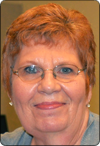
When Florence Ruble began her career at Metro Transit in 1985, she was the only person in the scheduling department with a computer. Later in her career, she helped the agency begin using technology that would help automatically collect passenger boarding data – at times climbing to the top of 10-foot ladders to mount detection equipment on light poles and other street fixtures. But when she retired after 32 years of service, it wasn’t her proficiency with technology that people remembered her for. It was the way she supported those around her, and especially the employees she led over 23 years as a Data Collection Supervisor. At her retirement, co-workers said Ruble was always the one to suggest and organize a potluck, or to pick up the phone and listen when Data Collectors encountered issues on the road. The relationships she built, Ruble said shortly before her retirement, are what kept her coming back for more than three decades. “I got more comfortable and had such good people to work with, so I said, ‘OK, I’m going to stay here,’” Ruble said.
Before she started, though, Ruble wasn’t quite sure what she was getting into. She applied for a job as a Data Processing Aide after seeing it advertised in the newspaper. It seemed like a good fit, she said, because she’d done similar work at the Powers Department Store, which was closing. But, she said: “I just assumed it was a garage with a bunch of buses. I never imagined how big it was.” The organization Ruble stepped into didn’t look much like the one she left behind, though. In her first few years, Ruble helped transfer hand-written route information into a computer system that built operator schedules. It would be several years before others in the scheduling department would also begin using computers. The next leap came with the arrival of Automatic Passenger Counters, or APCs. The technology allowed passenger and schedule data to be automatically collected through sensors, instead of being counted manually by employees. Because the technology could only reach a portion of the system at first, Ruble helped develop sampling methods that expanded their impact. The work was hands on, too – Ruble helped mount sensors in the field and pulled disks that stored data from the buses. While that technology replaced some of the manual counting that took place, Ruble continued to oversee Data Collectors who spent their days counting bus and light rail passengers and tracking on-time performance. That information helps verify and supplement the automatically-collected data. Ruble said she was proud of the work she and her team did over the years. “I know the information we collected over the years made a difference,” she said. “It’s so important because that’s really the first step in building the schedules.”
Outside of work, Ruble enjoyed spending time with her family, including husband Jim and several pets, and following the Minnesota Gophers. Shortly before her retirement, she said she’d miss her co-workers. “After seeing them every day, they’ve really become family,” she said. Ruble passed away in December 2017.